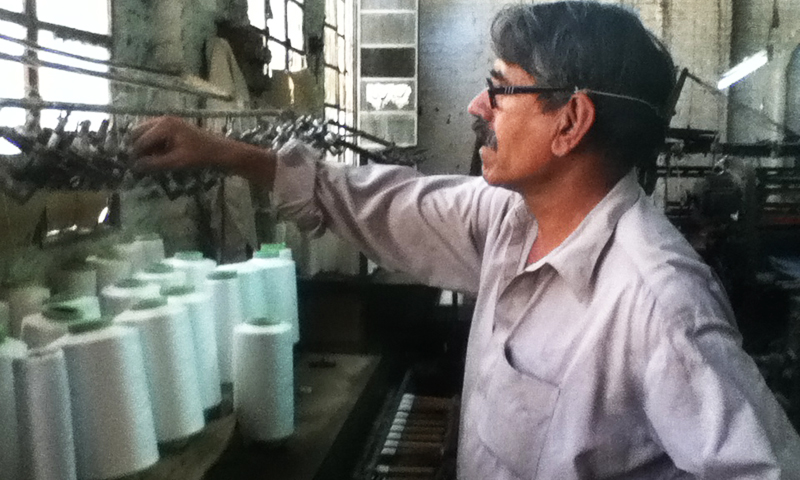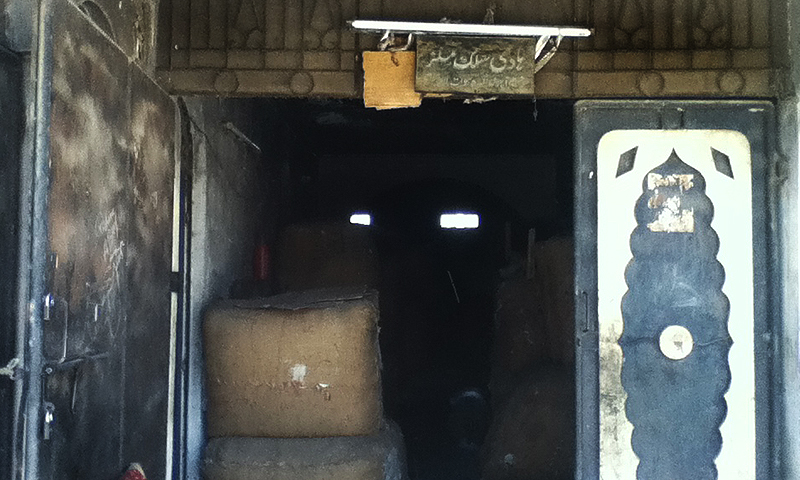Fifty-five year-old Raheemullah Khan waits at Mingora’s Green Chowk early in the morning, with his work tools dangling from his shoulders.
Employers usually pick up daily wage labourers like Raheemullah for construction work, but today, no one has taken notice of the man who’s been waiting for almost two hours. After 9 am, he gives up.
Raheemullah is used to coming home without a daily wage now – it became routine after he lost his job at a silk factory, which was destroyed by militants in 2008. After the factory, located in Tehsil Kabal, was damaged, around 90 employees who were earning Rs 15-20,000 a month lost their jobs.
“I worked in silk factories for almost 30 years and I was running ten machines at a time – I was set to finally start earning more because of my work experience, but now I’m forced to search for work on a daily basis. No one is ready to employ me because I’m too old,” Raheemullah explains.
Forty-nine-year-old Aleem Khan had also worked at the same factory for 25 years. “The owner of my factory sold the machinery at a low price after the terrorist attack,” he says.
There are many more stories similar to Aleem’s and Raheemullah’s. Jalandhar Khan, a 57-year-old, was working at the Khyber Silk Mill in 2007, and after the closure of his factory, he now works as a security guard on a monthly salary of Rs 5,000. President of the Muttahida Itifaq Labour Union Cosmetics and Silk Industries Swat, Haji Abdul Wadood says that Swat was once known as the hub of Pakistan’s silk industry. Workers from across the country would come here to earn a livelihood for their families.
Wadood adds that over 500 silk factories were operational in the district before the onset of militancy in 2007. Around 30,000 labours were working in these factories. “Due to militancy, 440 silk factories were closed down one by one while around 26,000 labourers are still jobless,” he says.
Most of the factories were located in Odigram, Dad Pand, Charbagh, Dangram, Matta, Kabal, Bra Bandi, Nengulai, Lower Bandai, upper Bandai and Rahimabad areas of the district. The factories were producing different kinds of cloth including satin, shameez, Marina and Shanghai which were not only sold in Pakistan but also exported to South Korea, the United Arab Emirates, Japan, Taiwan and Saudi Arabia.
Militancy wasn’t the only death knell for Swat’s silk industry. The president of the Silk Mill Owners Association, Serzameen Lalaje, says that the silk industry was established in Swat in 1964, while the city become an industrial zone in the 90s because of the Afghan Transit Trade agreement. “After ending the Afghan Transit Trade agreement in 2000, problems for the silk industry started in Swat because it had provided a cheap source for getting raw material for silk mills,” he said.
From there, it only got worse. Lalaje said that owners started purchasing thread from Punjab and Sindh to continue their business but in 2007, when militants overran Swat, it resulted in heavy losses. “The machinery and buildings of silk mills in Tehsil Kabal, Matta and Mingora were badly damaged by the shelling, bomb blasts and mortar attacks,” he adds. “It was difficult for factories to survive as they remained closed for almost three years from 2007 to 2009 in the valley."
For the owners who sold their mills, it wasn’t an easy decision. The owner of the Shangla Silk Mill, Haji Muhammad Baz Khan, said that it was difficult for him to sell his factory machinery because he was unable to repair the damaged machinery unless he invested a great deal of money in the repair, which he didn’t have. “The government provided us some compensation for building losses but it did not give us money as compensation for machinery loss,” he explains.
Former Khyber Pakhtunkhwa Minister for Labour and Manpower Sher Azam Wazir tells Dawn.com that the provincial government led by Awami National Party (ANP) had issued Rs 100,000 to silk mill owners whose buildings were partially damaged, and Rs, 400,000 to the owners of wholly damaged buildings. “It was difficult for the provincial government to compensate the loss of machinery but a detailed report has been sent to the federal government to get financial assistance in this regard."
It remains to be seen when and if this compensation will ever arrive.
Load shedding adds to woes
For those who are lucky enough to have retained the shrinking pool of jobs in the industry, like 52-year-old Baksh Rawan, it’s difficult to carry out one’s job when there’s no electricity to keep the machines running. Rawan, who works in Haroonur Rasheed Silk Mill in Raheemabad, says he can only works for four hours out of his 12 hour duty due to load shedding. “How I can fulfill the monthly expenses of my family, if I will only work for four hours a day?” he asks.
Ali Gohar, a 36-year-old who works in the same mill adds, “The owner gives me Rs 1.50 to prepare one metre of cloth. I can only prepare 120 metres of cloth in those four hours of electricity,” he says. In total, he earns only Rs 180 a day. On that salary (Around Rs 5,400 a month), it’s difficult to get by. “Sometime I think I should admit my daughter in a private school but I don’t think my dream will be fulfilled in the present circumstances,” Gohar says.
Newly elected Khyber Pakhtunkhwa MPA Fazal Hakim says the provincial government led by Pakistan Tehrik-i-Insaf (PTI) will try its level best to revive the idle factories. “The PTI government believes this is the only way for skilled labourers to earn income and meet the monthly expenses of their families,” he declared.
Meanwhile, people like Raheemullah wait for the day they can return to a regular job. “Most of the time I return home without a rupee … People have now refused to extend loans to me and I am thinking of begging on the streets to meet my needs.”

















































